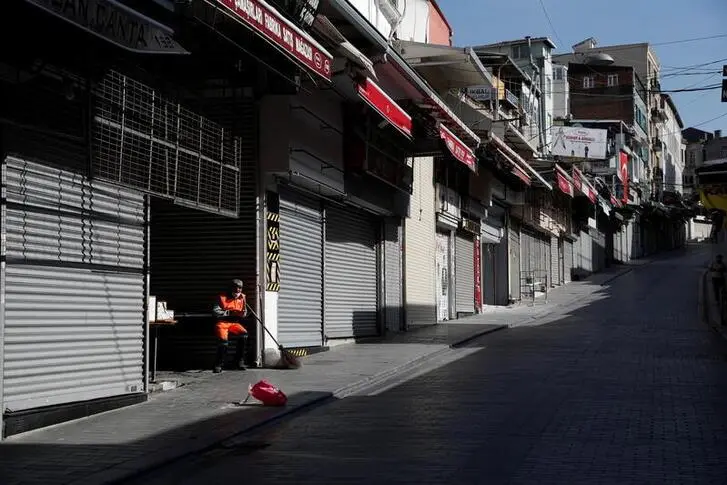PHOTO
The coronavirus pandemic and its disquieting effects are likely to leave significant marks on societies around the world for many years to come.
Beyond the immediate physical threats of COVID-19, the health crisis is expected to have many serious consequences in several aspects of people’s lives. These are not only limited to economic repercussions but also social and psychological ones.
For the leadership of several countries the pandemic has come to represent a litmus test of their ability to manage crises, their political legitimacy, and the relationship between state and society.
No country has been spared the effects of the pandemic and Turkey, the geographic location of which makes it a transit point between Asia and Europe, is no exception. In fact, the situation in the country is now the worst it has been since the outbreak began.
On April 26, President Recep Tayyip Erdogan announced a new set of restrictions on movement. It came as the Health Ministry announced more than 37,000 new confirmed cases of COVID-19, the fourth-highest daily total in the world. The “nationwide full lockdown,” which began on April 29 and will continue until May 17, covers the rest of the Muslim holy month of Ramadan, as well as three days of the Eid holiday that marks its end.
Erdogan said that the daily total of new COVID-19 cases must be immediately reduced to fewer than 5,000 so that Turkey, a country that relies heavily on income from tourism, can reopen its borders in tandem with the rest of Europe and attract visitors.
However, many think the authorities were too slow to act in imposing stronger precautionary measures. The government has been criticized in particular for going ahead with dozens of party meetings that took place in enclosed halls and were attended by tens of thousands of people from across the country. Medical experts believe these gatherings contributed to the escalating infection rate.
Kemal Kilicdaroglu, the leader of the main opposition Republican People’s Party (CHP), condemned the government for waiting so long to make the lockdown decision. “Politics came into play, halls were filled and we have arrived at today’s situation. Now there are no tourists,” he said.
The government also came under fire last year for concealing the true magnitude of the health crisis in Turkey by under-reporting cases. It admitted that this was the case and changed the procedures.
Russia, which was the biggest source of visitors to Turkey last year despite coronavirus restrictions, has suspended most air travel to the country until June because of the surge of infections. The tourism sector contributes greatly to the Turkish economy, which was already fragile before the pandemic. Now, with inflation in the double digits, the currency sinking and many workers struggling financially, the lockdown is piling more pressure on people, especially those who do not benefit from economic-relief packages.
Meanwhile, a ban on alcohol sales during the lockdown has provoked a strong backlash, with many people accusing the conservative government of trying to impose its Islamic values on the population of 83 million people.
Turkish officials said the decision was based on science, but on social media and other online forums many people criticized the move as being religiously motivated. Members of CHP opposed the ban, saying that it reflects a desire by Erdogan and his conservative party colleagues to forcibly impose a more religious lifestyle in Turkey, and that in practical terms it will have little effect on curbing the spread of the virus.
The booze ban was the top trending topic on Twitter in Turkey on Tuesday, with thousands of secular Turks using the hashtag #alkolumedokunma, which translates as “don’t touch my alcohol.”
While some level of political polarization is perhaps inevitable in any country, it seems to have become particularly unwholesome in Turkey in recent years. This is not happening only in Turkey, of course. Political polarization is putting a growing strain on countries around the world, including India, Poland and the US. In some cases a lack of effective governance during the pandemic has caused social divisions to widen.
In India, for example, where polarization is particularly high, the country is currently recording the highest numbers of COVID-19 cases in the world. Some people in the Hindu-majority nation have blamed Muslims for the pandemic. Meanwhile, some citizens of countries with expat-majority populations blame the migrants, and some elements in European nations have falsely blamed refugees and asylum seekers for spreading the virus.
All of this finger-pointing is causing ever greater polarization in societies and making the integration process much more difficult for vulnerable people who are forced to flee their own countries.
We must not allow the global pandemic to be turned into an ideological issue, in Turkey or anywhere else. Unfortunately, popular political ideologies in many countries create greater polarization and have influenced how nations and leaders respond to coronavirus pandemic.
It is necessary for all governments to adopt acceptable norms and embrace cooperative behavior to build trust, which operates as a society’s underlying immune system. If that system collapses, because trust has been eroded, it can cause more damage even than a virus.
If leaders are to build trust between state and society, effective governance is required. Otherwise the worst permanent effect of the pandemic could be growing societal divides that will last for decades.
- Sinem Cengiz is a Turkish political analyst who specializes in Turkey's relations with the Middle East. Twitter: @SinemCngz
Copyright: Arab News © 2021 All rights reserved. Provided by SyndiGate Media Inc. (Syndigate.info).





















